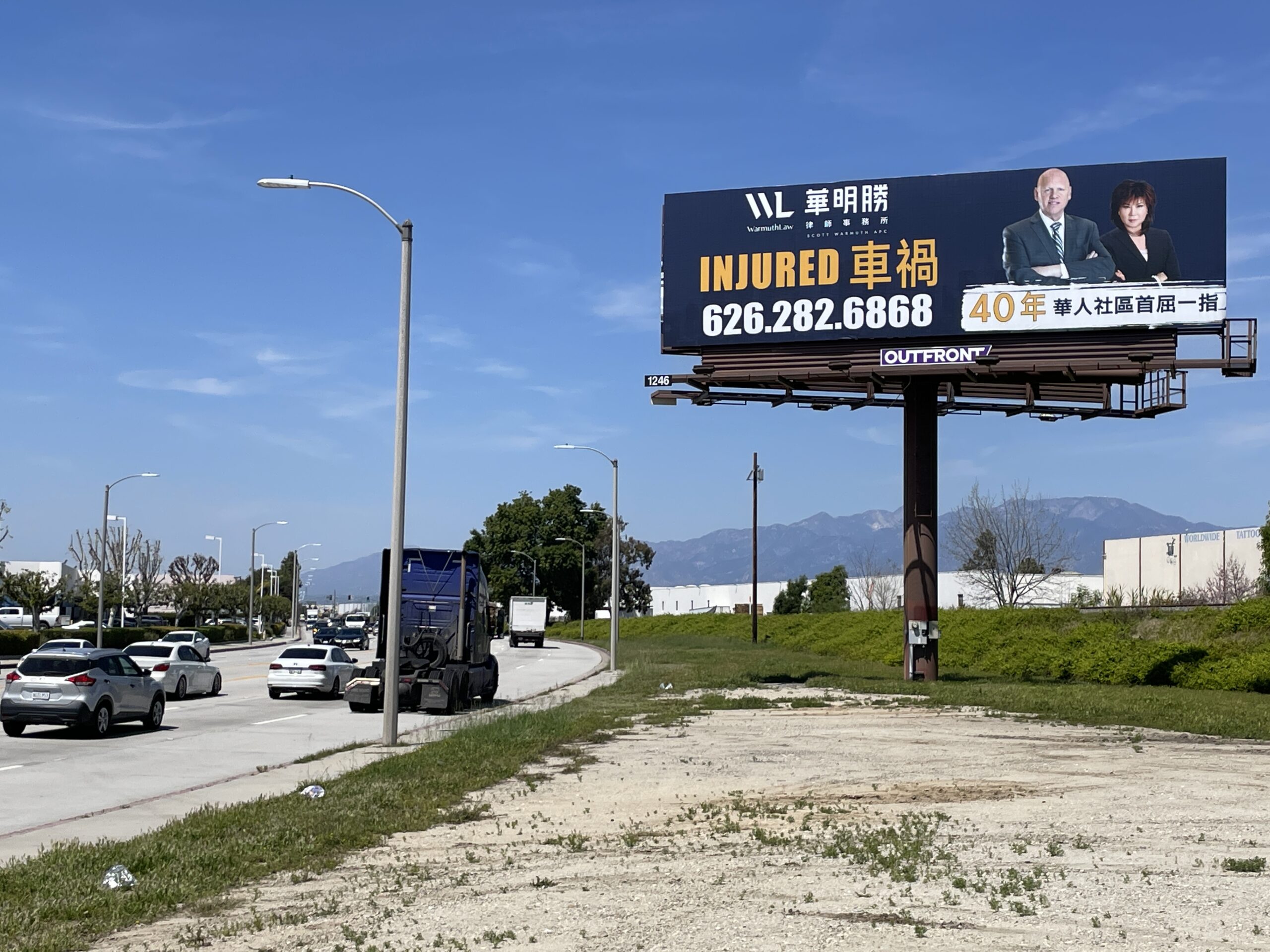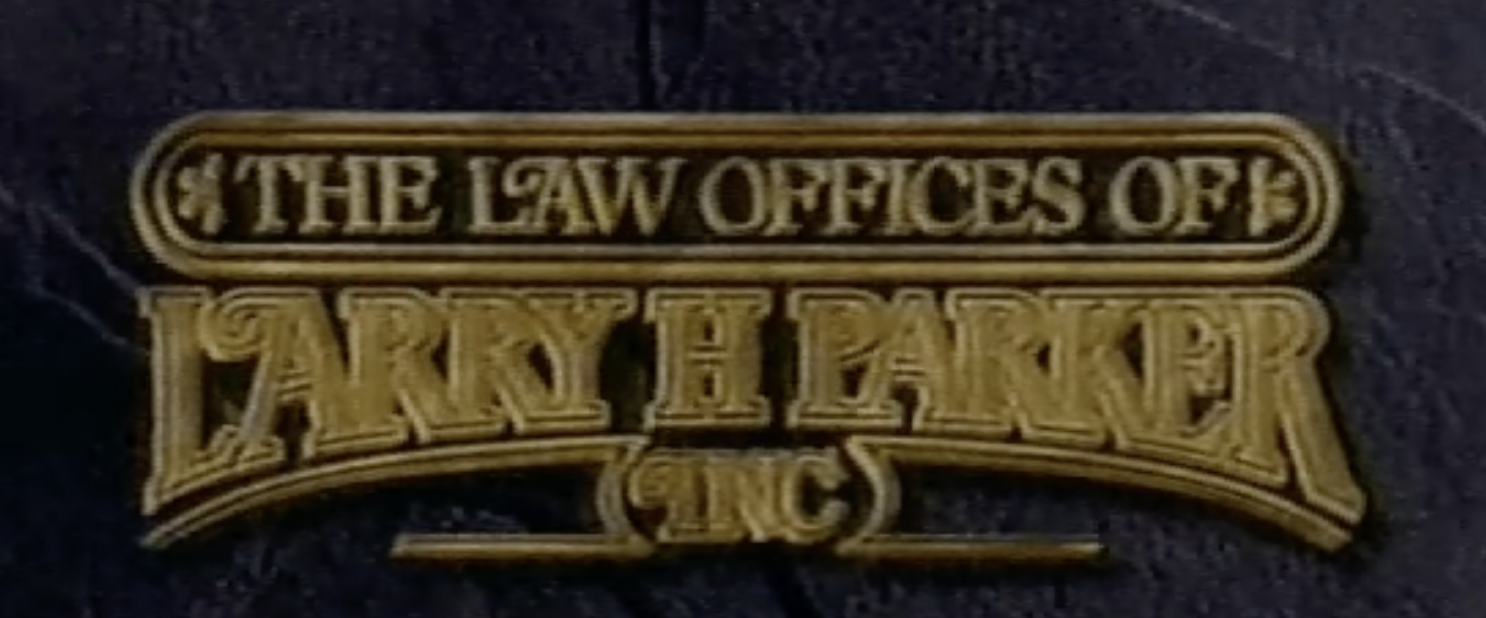BY FRANK SHYONG | COLUMNIST LA Times
 Attorney Scott Warmuth, at his office in San Gabriel. His billboards have been a fixture in the San Gabriel Valley, and the ads have brought a level of renown that’s unusual for a personal injury lawyer.(Robert Gauthier / Los Angeles Times)
Attorney Scott Warmuth, at his office in San Gabriel. His billboards have been a fixture in the San Gabriel Valley, and the ads have brought a level of renown that’s unusual for a personal injury lawyer.(Robert Gauthier / Los Angeles Times)
There’s a bit of humor I often hear about attorney billboards in the San Gabriel Valley, a region of 2.1 million people largely composed of Asian and Latino immigrants and their families.
All the Chinese attorneys use white men on their billboards to appeal to the Chinese community, people say, and all the white attorneys include Chinese employees on their billboards, also to appeal to Chinese clients.
It’s a cultural irony created by the racial expectations of the law firms’ clientele, primarily Chinese immigrants and their families. Recent immigrants might worry that Chinese attorneys don’t have the same connections to local institutions, so a white face helps ease those concerns. They might also assume a white attorney lacks Chinese translation and cultural sensitivity, so a Chinese face addresses that.
Obviously those assumptions about Chinese and white attorneys aren’t always true. Chinese Americans are just as likely as white attorneys to have connections and be skilled at navigating American systems. And there are plenty of Chinese Americans who are less than fluent in their culture’s languages, and surely a few white attorneys who can speak Chinese languages.
But law firm marketing is more about comfort than reality, said Scott Warmuth, an attorney who was one of the first to put up Chinese billboards in Monterey Park about a decade ago.
Warmuth’s billboards have been a fixture in the San Gabriel Valley, and the ads have brought a level of renown that’s unusual for a personal injury attorney. Rep. Judy Chu (D-Monterey Park) has jokingly referred to him as the “most famous” person in the San Gabriel Valley.
Warmuth, 67, began his practice in Monterey Park in 1984 with a Taiwanese friend who was looking for a white attorney with whom he could launch a practice. At the time, it was a widespread belief in the Chinese community that white attorneys knew American systems better.
“My Taiwanese friend at the time said, ‘You need to be white.’ There was a big portion of the population that felt it was better to have a white attorney,” Warmuth said.
Warmuth grew up outside of Seattle, and, before he began his law career, he served as an elected city councilman when he was 18. At just over 6 feet, he strikes an imposing figure on billboards, staring down the camera with a confident smile and folded arms. In person, he’s more reserved and thoughtful, prone to boyish excitement.
To reach the Chinese community, he said, he needed Chinese-speaking people. Warmuth’s Taiwanese partner helped make introductions to key members of the community. And Tammy Wong, his office manager and one of the firm’s early employees, helped the firm establish a presence in the Chinese community.
Warmuth is competitive and passionate about marketing, and he admits his interest in cultural communication was part of a strategy to become the top law firm in the area. (Wong, now 70, is quite competitive too, if the framed Chinese calligraphy in her San Gabriel office spelling the word “victory” is any indication.)
Advocating for Chinese clients helped him understand the realities of racism and discrimination, he said. Back then, insurance companies discriminated against people with foreign names and were prone to accusing immigrant claimants of fraud without real cause, Warmuth said. Chinese clients often would get suspiciously low insurance payouts or no payments at all for routine claims.
Wong, whose family immigrated to New York City from Hong Kong in 1969, said she wasn’t very impressed with Warmuth at first.
“It was a tiny office, and there were only four people. But I didn’t care - I just wanted to learn,” Wong said.
Wong grew up in the Bronx and had worked as an insurance agent when she first came to Monterey Park. She saw Warmuth’s advertisement in the World Journal, a Chinese-language newspaper, and applied for a job handling paperwork.
She had no legal background, but she was fluent in Mandarin, Cantonese, English and Taishanese, a Chinese dialect often spoken by residents of American Chinatowns. And she understood the fears and anxieties of recent immigrants trying to navigate a new system. Her hard-nosed, plain-spoken manner quickly made her Warmuth’s point person for the Chinese American community.
Wong attended banquets, fundraisers and other events on the firm’s behalf. She fielded questions from Chinese-language media, signed up clients and quickly became essential to the business.
Warmuth said cultural intelligence has had a tangible impact. When he first began the business, he adopted a Chinese name: Hua Ming Si. But the last word in his name is a cognate for the Chinese word for death, which bothers more superstitious clientele.
One of his Chinese employees suggested that he change it to Hua Ming Sheng. The change brought a sharp and lasting uptick in business, Warmuth said.
 Scott Warmuth and Tammy Wong, at their office in San Gabriel. (Robert Gauthier / Los Angeles Times)
Scott Warmuth and Tammy Wong, at their office in San Gabriel. (Robert Gauthier / Los Angeles Times)
Wong and Warmuth also co-hosted a segment on Chinese-language radio station KAZN AM 1300 in which they answered legal questions from callers and explained aspects of the criminal justice system.
These days, Wong hosts the segment by herself, though she consults with Warmuth on topics requiring an attorney’s input. One recent week, the segment covered domestic violence and criminal law relating to family members, and how police are likely to make an arrest if they respond to a case of suspected domestic violence.
Wong avoids referring to cases and headlines that Chinese immigrants might not know about. She knows Chinese clients are preoccupied with getting a good deal, so she encourages them to shop around and explains how the process works before trying to sell them on Warmuth’s firm.
After the first billboard, Wong and Warmuth began to appear side by side on the advertisements. Now Wong shares some of Warmuth’s fame. She laments the fact that she now has to wear makeup and get dressed up whenever she leaves the house, lest she be recognized in her pajamas at the grocery store.
Warmuth said it’s far more common for Chinese attorneys to use Chinese faces on advertisements now.
“When I started there were very few Chinese professionals compared to today. Now there are far more, and that’s a choice that wasn’t there 40 years ago,” Warmuth said. “And that’s a good thing.”
Warmuth still has 16 billboards around the area. Recently they began appearing in a language the firm had never used before: English.








